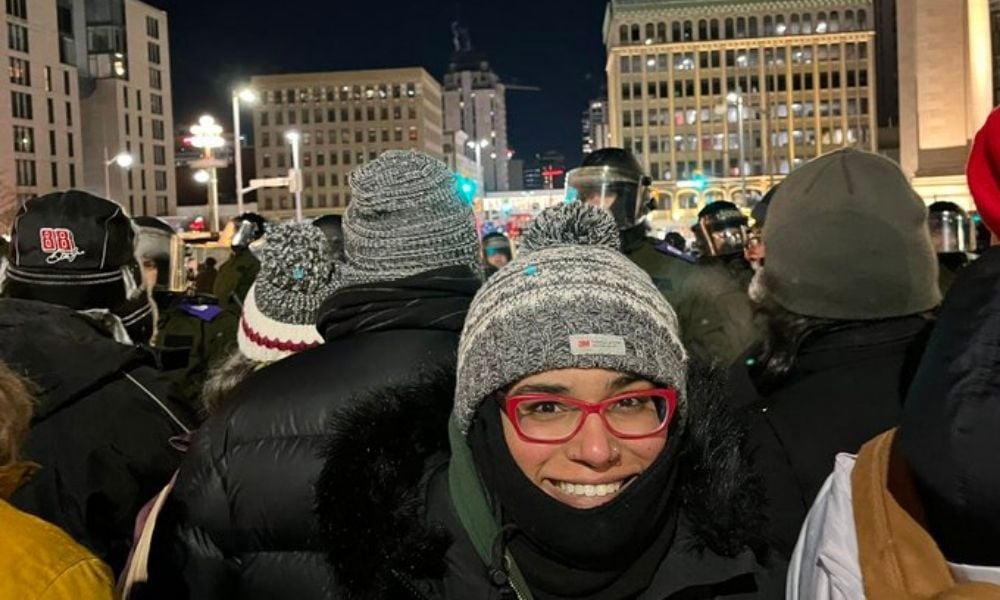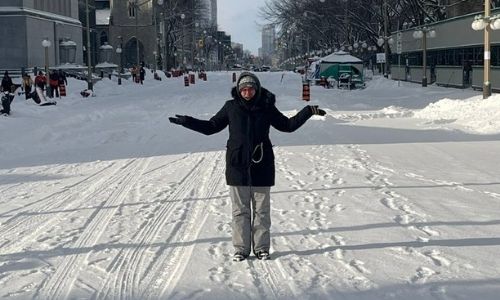The Toronto lawyer spent the last few weeks as a 'citizen journalist' documenting the protest

Thousands of protestors gathered in Ottawa over the past month – ostensibly to oppose vaccine mandates, but then adding several other demands that included, according to at least one manifesto filed online by organizers, a move to overthrow a democratically elected government.
So you may be excused if you failed to notice one person amongst the crowds of people packed in front of the Parliament buildings as part of what some have described as an "occupation" of downtown Ottawa.
Her name is Carmya Sa’d, an outspoken Toronto lawyer who has used her legal skills for progressive causes ranging from defending those charged with criminal offences to landlord and tenant disputes.
This time, Sa’d decided she needed to be a so-called “citizen journalist,” wading into the crowd of protestors – a group with whom she feels no kinship but wants to understand better – to document the goings-on amongst those demonstrating. She’s been keeping up with the essential parts of her legal practice while staying in Ottawa but has spent a large amount of her days and nights wandering the blockaded streets to capture the crowd’s mood.
This weekend, the blockade ended with police forces from across Canada, some in riot gear, helping Ottawa police remove trucks and people from the so-called “red zone” around the Parliament buildings and downtown. But Sa’d has stayed to provide comprehensive minute-by-minute coverage of the bail hearings of protest organizers Tamara Lich and Patrick King. (Lich was denied bail today, a decision her lawyer says is being appealed, while no decision will come in the case of King until at least Friday.)
Sa’d admits that financially, the past month has not been easy. She has a tweet at the top of her Twitter account asking for donations via e-transfer – though that is only because Go Fund Me has denied her request to raise money through its site on the basis she is too political.
But this has not stopped Sa’d in her quest to gain insight into the protest.
“I really wanted to understand what made these people tick, why they were doing what they were doing,” says Sa’d. “I wanted to be a fly on the wall and observe.”
However, Sa’d did more than observe. She documented her time amongst the protesters on her Twitter account – acerbic comments, thoughtful reflections, and sometimes just writing about the weirdness of living on Beavertails and Pizza Hut personal pan pizzas until the outlets were closed due to the protests. (“Don’t judge me,” she says in her tweet about that.)
She also managed to capture the other-worldliness of a blockade that came with bouncy castles, hot tubs and pig roasts. Take the example of running into Ryan, who had just come out, half-naked, from a hot tub on a night when temperatures dipped to the minus double digits. (For anyone worried about this protester’s well-being, Sa’d posted a tweet that indicates he seems to be doing just fine.)
As for her coverage of Lich and King’s bail hearings, most of it was more analytical and factual than opinionated. However, Sa’d humorously tweeted during Pat King’s bail hearing. “This is not legal advice, but maybe don’t livestream yourself threatening public officials with bullets,” she wrote, referring to King's comment on social media that the “only way this ends is with bullets.”
Most of her 28-thousand-plus Twitter followers can’t get enough about what she is documenting. Writes one fan after Sa'd appeared on CBC News Network Saturday night: “She is a smart, wise woman and a badass lawyer. We need to pay attention to the hard work she has been putting in the last several weeks, and her words tonight.”
But it hasn’t been a bed of roses for Sa’d either, especially as the longer she stayed, the more people realized who she was and what she was tweeting. “Some wanted to engage, others came to party, but there were some who wanted to deny me the freedom of my voice, which is ironic.”
Just a few days ago, she posted a video of being confronted by a group who took issue with her posting a screenshot of a protestor who was encouraging people to find out where she lives, presumably so she could be harassed. She was also confronted by a group that questioned her bona fides as a lawyer.

Caryma Sa’d stands on street empty of trucks and crowds following police intervention on the weekend
So how did Sa’d, who graduated in 2015 and set up her own practice, come to take on the role of citizen journalist?
Part of it revolves around her father, who died of COVID-19 in March 2021. That was a blow that made her reflect on why, when between 80 and 90 per cent of Canadians are double-vaccinated, there is a defiant group opposed to any mandate that would compel them to get a COVID-19 vaccine. “It really got me interested in what I would call COVID denialism. This protest is a culmination of my work in this area.”
However, as many others have noticed, Sa'd's observations from being embedded with the protestors indicate this movement appears to go beyond objections to vaccine mandates. The shouting may be about freedom, but Sa’d worries that these protests are a “coming out party” for an American-style “alt right” movement in Canada. The fact that there is documentation that much of the money fueling this cause came from outside Canada (mainly from the U.S.) is something about which Sa’d is “deeply concerned.”
For all the protesting about vaccine mandates, Sa’d considers this issue as a gateway for something far more sinister.
“The reason why I am here is because I am worried about what type of Trojan horse this movement represents, and what seems to me to be a surge towards right-wing populism.”
As a person of colour, Sa'd is also disturbed that many protesters (such as organizer Pat King) have expressed white nationalist views, and she worries that they are “unaware or wilfully blind” to these connections.
Sa’d is also concerned about the level of understanding protesters have about their rights and freedoms under the Charter. “They use so many terms, such as ‘inalienable rights,’ and ‘First Amendment rights,’ that come from across the border,” she says. She also notes that protesters seem to rely on the Canadian Bill of Rights, thinking it is similar to the U.S. Bill of rights, which is comprised of the first ten amendments to the U.S. constitution.
Although the Canadian Bill of Rights remains in effect, many of its provisions were superseded by the Canadian Charter of Rights and Freedoms in 1982. The Charter is a much broader human rights law. It also has greater power because it applies to federal and provincial laws and actions.
Sa'd also points out there is a lack of understanding about Section 1 of the Charter, which says that Charter rights are “not absolute” if a greater good can be proven.
“So there is real misinformation about the foundation of Canadian legal principles.”
As for the use of the Emergencies Act, Sa’d says she worries about the precedent its use sets. However, the “real problem” stemmed the lack of action to deal with the protesters and truck convoys early on. She wonders if police forces, consciously or not, sympathized with the protesters.
“It’s no surprise then that the federal government decided to use the Emergencies Act. We’ll have to see what comes up at the inquiry that will delve into these questions later.”










